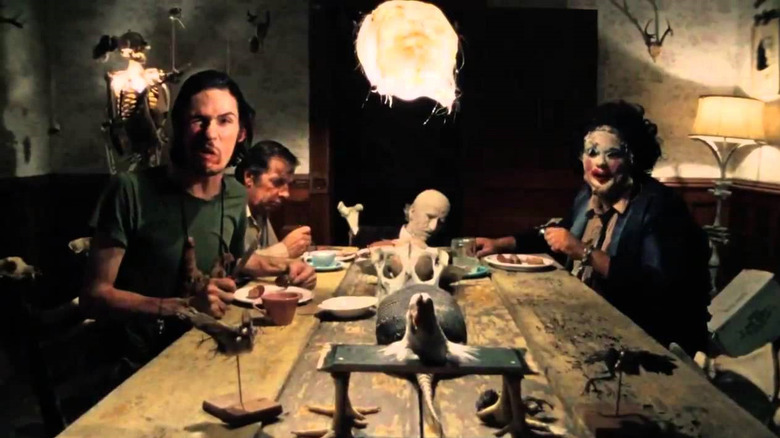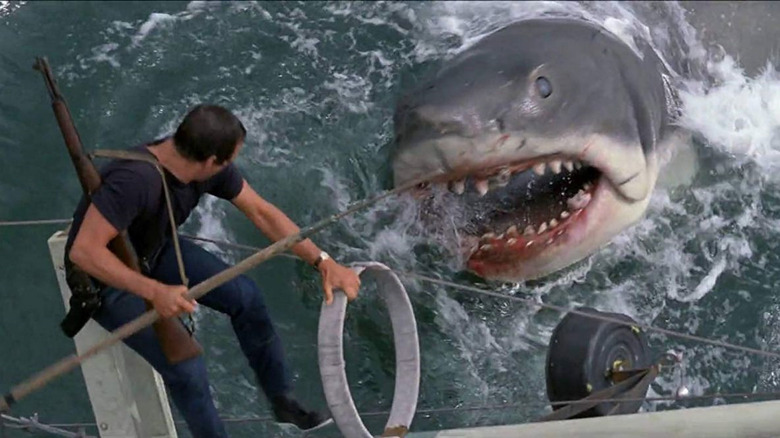Quentin Tarantino Personally Thinks These Six Movies Are 'Perfect'
"To me," Quentin Tarantino writes, "'The Texas Chain Saw Massacre' is one of the few perfect movies ever made." The celebrated "Once Upon a Time in Hollywood" director drops the observation near the tail end of his latest book "Cinema Speculation," a nonfiction rumination on cinema. In fact, his praise of "Chain Saw" isn't even the focal point of the chapter it's found in, it's a preamble to an entire chapter dedicated to Tobe Hooper's 1981 big studio follow-up (bigger than "Eaten Alive," that is), "The Funhouse." He goes on to write that there are few movies that can really be called "perfect," which is fine since that isn't the end goal when it comes to storytelling. "Nevertheless," he goes on, "when it's accomplished (even by accident), it's an achievement."
Speaking with Jimmy Kimmel while promoting the book, Tarantino listed a handful of movies that he considers perfect, prefacing his picks with clarification on what he means by the "perfect" movie. He told Kimmel:
"Well there's not many of them. That just bemoans the fact that the film art form is hard. Look, when you say perfect movies you're talking about any individual person's aesthetic but even trying to account for all aesthetics... perfect movies kind of crosses all aesthetics to one degree or another. Might not be your cup of tea, but there's nothing you can say to bring it down."
The unassailable six, in Tarantino's estimation, are:
- "The Texas Chainsaw Massacre" (1974)
- "Jaws" (1975)
- "The Exorcist" (1973)
- "Annie Hall" (1977)
- "Young Frankenstein" (1974)
- "Back To The Future" (1985)
Indeed, there's little that can be said to knock these movies off of their respective pedestals.
Three cheers for horror movies
Plenty of critics will dedicate paragraphs to the latter three of the bunch, but horror rarely gets to hold onto the spotlight, so it's a balm to see such lowbrow genre representation on Quentin Tarantino's quick-fire roundup of perfection. "The Texas Chain Saw Massacre" has been influential from the jump; not only has the slasher classic had a major impact on subsequent scary movies like Ridley Scott's "Alien," but it has remained a gold standard for horror with its taffy-pulled dread, repulsive aesthetics, and visceral dissection of the American family unit. This is why Tarantino choses to speculate on Tobe Hooper's post-"TCM" filmography instead – it's such "a one-of-a-kind beast," he argues, that no subsequent work of Hooper's could surpass it.
As for the movie that made you think twice about going into the water, "Jaws" is observed in the book with a feverish reverence. Tarantino writes:
"When 'Jaws' came out in 1975 it might not have been the best film ever made. But it was easily the best movie ever made. Nothing ever made before it came close. Because for the first time the man at the helm wasn't a Richard Fleischer or a Jack Smight or a Michael Anderson executing a studio assignment. But a natural born filmmaker genius who grooved on exactly this kind of movie and would kill himself to deliver the exact vision that was in his head.
More on Steven Spielberg's steadfast vision for the Peter Benchley book adaptation can be found here.
As for William Friedkin's "The Exorcist," Tarantino doesn't have much to say in "Cinema Speculation." But in the past, he's teased that he wants to do a scary movie on the level of the demonic-possession film — something fans have been begging for ever since that creepy Spahn Movie Ranch sequence in "Once Upon A Time in Hollywood."

